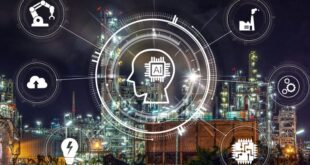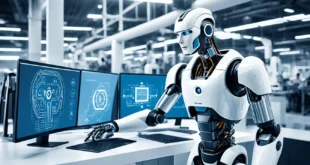Introduction to AI technology
Artificial Intelligence is no longer just a concept confined to sci-fi movies. It has woven itself into the fabric of our daily lives, transforming how we interact with technology and each other. As we step into 2024, AI continues to evolve at an astonishing pace, powering everything from smartphones to smart homes. Imagine waking up in a house that knows your preferences better than you do or a car that drives itself through traffic while you catch up on emails.
This blog post will explore the incredible advancements in AI technology across various devices and industries. We’ll dive deep into its applications, potential future developments, and even touch upon some ethical considerations surrounding this powerful tool. Join us as we uncover what makes AI the game changer of our time!
How AI is being used in different devices
AI technology is making waves across various devices, enhancing their functionality and user experience. From smartphones to smart appliances, its influence is undeniable.
In smartphones, AI powers applications that can recognize faces and voices. This makes interactions more seamless and intuitive. Virtual assistants like Siri or Google Assistant are constantly learning from users to provide personalized responses.
Smart homes leverage AI through IoT devices that communicate with each other. Imagine adjusting your thermostat or turning off lights remotely via an app. The convenience it brings simplifies daily tasks significantly.
Meanwhile, in the transportation sector, AI algorithms assist in route optimization for navigation apps. They analyze real-time data to suggest faster paths while predicting traffic conditions ahead.
The healthcare field also benefits immensely as diagnostic tools use AI to analyze medical images swiftly and accurately. This fosters timely decision-making for patient care without overwhelming medical professionals.
Smartphones and virtual assistants
Smartphones have transformed into powerful AI hubs. They seamlessly integrate virtual assistants, making everyday tasks easier than ever.
Imagine asking your assistant to set reminders while you multitask. It’s all about convenience now. Voice recognition technology has evolved significantly, allowing for more accurate responses and tailored interactions.
These devices learn from user behavior. The longer you use them, the smarter they become. Personalized recommendations enhance your experience in everything from music choices to travel plans.
Security is a priority too. Facial recognition and biometric authentication are standard features now, adding an extra layer of protection.
As we move forward in 2024, expect even deeper integration of AI within smartphones. Innovations will continue pushing boundaries, redefining how we connect with technology daily.
Smart homes and Internet of Things (IoT)
Smart homes are revolutionizing the way we live. With the Internet of Things (IoT), everyday devices connect seamlessly, creating a network that enhances our daily routines.
Imagine adjusting your thermostat, lights, and security system all from your smartphone or voice assistant. This convenience is becoming standard in many households. Sensors detect movement and energy use, optimizing efficiency while ensuring safety.
Moreover, smart appliances learn user preferences over time. Your refrigerator might suggest recipes based on what you have inside. Meanwhile, robotic vacuums clean up without needing constant supervision.
The integration of AI into these systems allows for predictive capabilities as well. Homes can anticipate needs before they arise—turning off lights when no one’s home or preheating the oven at dinnertime.
As technology evolves further, our living spaces will become increasingly intelligent and responsive to individual lifestyles.
Self-driving cars and transportation industry
Self-driving cars are revolutionizing the transportation industry. These autonomous vehicles use advanced AI algorithms to navigate roads safely.
Sensors and cameras help them perceive their surroundings in real-time. This technology reduces the risk of accidents caused by human error.
Many companies are investing heavily in this field, pushing for wider adoption. With improved safety records, self-driving cars could transform urban mobility.
These vehicles also promise increased efficiency. Traffic congestion might decrease as intelligent systems optimize routes and reduce delays.
Public perception is evolving too. More people are starting to trust these innovative machines as they witness successful pilot programs around the world.
The implications extend beyond personal vehicles; ride-sharing services will likely become more automated. The future landscape of transportation appears poised for a significant shift with AI at its core.
Healthcare and medical advancements with AI
AI is revolutionizing healthcare, transforming patient care and operational efficiency. With advanced algorithms, it can analyze vast amounts of data quickly. This allows for accurate diagnoses that were once time-consuming.
Machine learning models assist in predicting patient outcomes based on historical data. Hospitals are using AI to forecast patient admission rates, which helps manage resources more effectively.
Telemedicine platforms now incorporate AI chatbots. These tools provide initial assessments and guide patients through their symptoms before they see a doctor.
Furthermore, personalized medicine is becoming a reality as AI analyzes genetic information. Tailoring treatment plans based on individual profiles improves success rates significantly.
Robotic surgical systems enhance precision during procedures. Surgeons benefit from augmented reality overlays that highlight critical structures in real-time, reducing risks involved in complex surgeries.
These innovations illustrate how AI continues to push the boundaries of what’s possible within the medical field.
Future predictions for AI technology in 2024
As we look ahead to 2024, the evolution of AI technology promises to reshape our daily lives significantly. Enhanced machine learning algorithms will enable devices to learn from user interactions more intuitively. This could lead to personalized experiences that adapt in real-time.
Expect greater integration of AI across industries. From finance predicting market trends with unprecedented accuracy to retail offering tailored shopping experiences, businesses are set for a transformation.
AI-driven automation is likely to streamline operations further, increasing efficiency and reducing human error. We may also see advancements in natural language processing, making virtual assistants even more conversational and helpful.
Moreover, ethical considerations surrounding data privacy and bias will push companies toward transparency and accountability in their AI systems. As regulations evolve, so too will the need for responsible innovation in artificial intelligence technologies.
Ethical concerns surrounding AI technology
As AI technology continues to develop, ethical concerns emerge. Privacy issues dominate discussions among experts and the public alike. With vast amounts of data being collected, there’s a fear that personal information could be misused or inadequately protected.
Bias in algorithms is another significant concern. When AI systems learn from historical data, they may inadvertently perpetuate existing stereotypes or inequalities. This raises questions about fairness and accountability.
Job displacement remains a hot topic too. Automation threatens traditional roles across various industries, leading many to worry about future employment opportunities for humans.
Moreover, the lack of transparency in decision-making processes poses challenges. Users often find themselves questioning how certain conclusions are reached by AI systems without understanding the underlying logic.
There’s an ongoing debate regarding the moral implications of autonomous machines making life-and-death decisions—especially in healthcare and military applications. The stakes are high, requiring careful consideration as we advance further into this digital era.
Conclusion
The landscape of AI technology in 2024 is transforming how we interact with the world around us. From smartphones that understand our needs to smart homes that anticipate our preferences, AI is seamlessly integrating into our daily routines. Self-driving cars are not just a futuristic dream; they are becoming part of the transportation revolution, promising safer and more efficient travel.
In healthcare, AI advancements offer new avenues for diagnosis and treatment, improving patient outcomes and streamlining services. Yet, as we embrace these innovations, ethical concerns loom large. The potential for misuse and privacy violations requires careful navigation to ensure responsible development.
As we move forward, it’s clear that the role of AI will continue to expand across various sectors. With endless possibilities on the horizon, staying informed about these changes remains essential for everyone navigating this evolving technological landscape. The future looks bright yet demands vigilance as we harness AI’s power responsibly.






